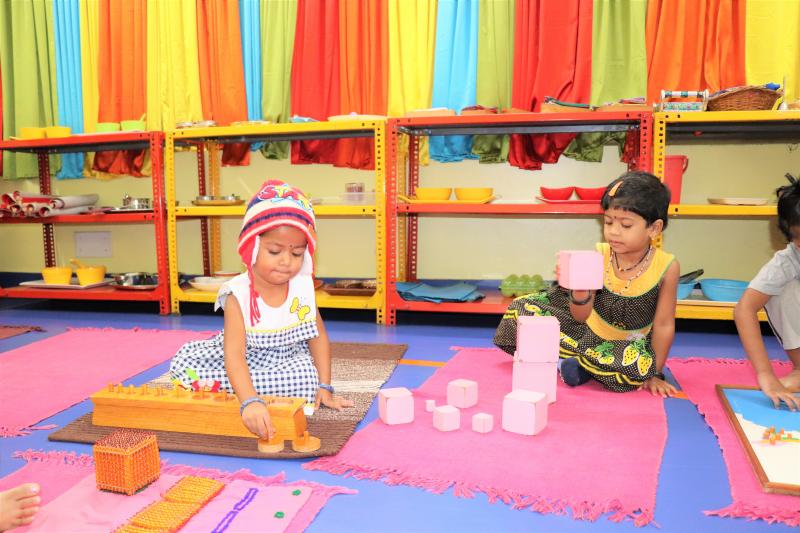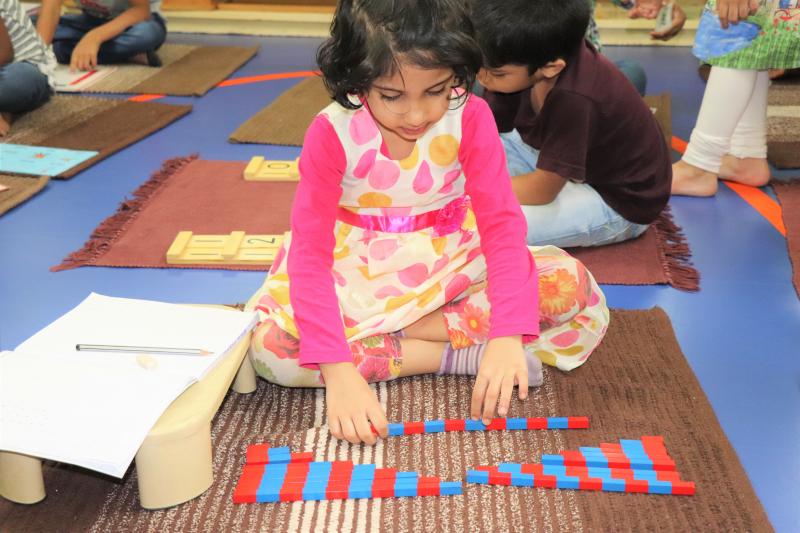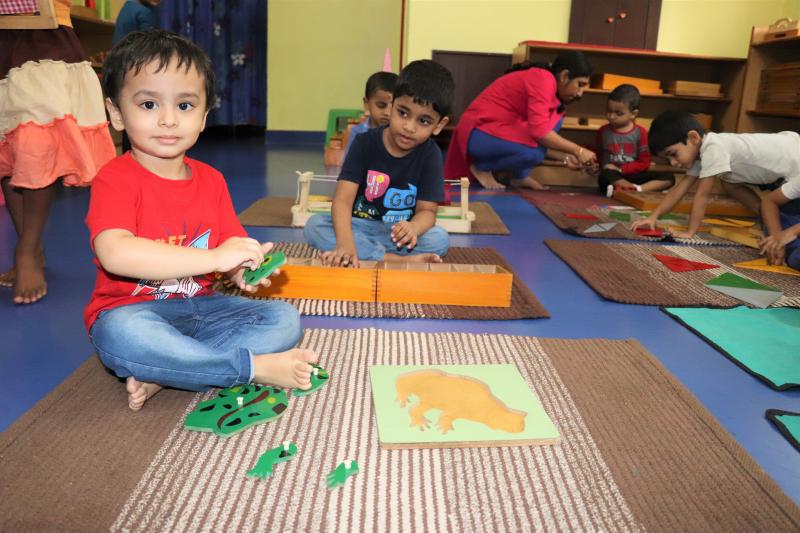Child-Care Montessori
Crafting future citizens
A unit of: AugKnow Academia (P) Ltd.
# 632, 17th Main (100 feet road),
3rd Block, Koramangala
Bangalore, Karnataka 560034
ph: +91 98 86 778 661
alt: +91-80 4095 7105
info
Montessori Program
"What the hand does, the mind remembers"
- Maria Montessori

Montessori education is an educational approach developed by the Italian physician and educator Dr. Maria Montessori.Pioneering a new form of education, centered specifically around the child, her principles and method spread throughout the world, producing a global vision for education that persists to this day.
Montessori method of teaching works in a methodical way. It is a process that encourages children to learn in their own way and at their own pace. Montessori classrooms have prepared environments which aim to promote the joy of learning. Children who experience the joy of learning are happy, confident & fulfilled children.
The years between three and six are not only the prime time for laying an academic foundation, but most importantly the years when children learn the ground rules of human behavior most easily. These are the years that help the children prepare to take their place in society through the acquisition of good habits and manners. Habits of concentration, perseverance and thoroughness established in the early years will produce confident and competent learners in later years.
Age criteria: 2.5 years & above
Timings: 9:00 am to 1:00 pm
Interesting watch: https://www.youtube.com/watch?v=GcgN0lEh5IA
CURRICULUM
1. Excercises of practical life (EPL)
Practical life activites are the everyday activities that children witness around them. There are three distinct nature of activities:
- Taking care of environment (such as brooming, gardening, washing)
- Taking care of one self (such as fastening of buttons, pouring water in a glass, tying a shoe lace, washing one's hands, walking on a straight line, carrying objects of different sizes)
- Social behaviour (like greeting, how to interrupt others, how to yawn, cough or sneeze, how to offer water/tea to others).
The purpose and aim of these activities is to help children achieve control in the co-ordination of movements, and also help them gain independence and adapt to the society. It is therefore essential to “Teach teaching, not correcting” so that children can be fully functionional members in their own societies.
Practical Life Exercises also aid in the growth and development of the children's intellect and improve concentration levels. Children also develop an orderly way of thinking.

2. Sensorial
With ample opportunity for hands-on learning and freedom of movement throughout the day, the Montessori environment provides a safe, nurturing place for a child to develop his/her senses.
The Sensorial Activities were developed to heighten the awareness of the child’s senses. Through repetition, the Montessori child is able to successfully differentiate between the slightest differences and variations in the world around him/her. The Sensorial materials sharpen the senses of young children by isolating one specific sense, such as colour, weight, size, shape, texture, sound or smell at a time, thus maximizing its refinement.

3. Mathematics
Montessori maths activities teach the most important concepts through hands-on work, movement and working in the group. With the help of the Montessori materials, children begin to recognize the shapes and names of numbers from 0 to 9. Quantity is introduced first and then children relate the written number with its specific physical quantity.
Quantities of units, tens, hundreds and thousands are introduced. The children become familiar with the decimal system and geometry. Adding, subtracting, multiplying and dividing is all part of the Montessori education. As children progress, the focus is stressed on more individualized and abstract work.
The Montessori mathematics curriculum is varied and challenging. The concepts are never forced upon children. The materials are very exact with built-in control of error to help develop the sense of accuracy, concreteness and independence. Children gain confidence from correcting their own work as well as developing problem solving and decision making skills.

4. Language
The development of language in a Montessori environment is an umbrella for the entire Montessori curriculum. Experiences gained from the Practical Life and Sensorial activities serve as a preparation for reading and writing. Children learn to listen, speak, and later to write and read through the multitude of materials and activities within the language area of a Montessori environment.
Language is divided into three parts: speaking, writing and reading. Speech develops naturally in a child. From 2 to 6 years of age, children are in the sensitive period for language and they are said to have an “absorbent mind”. While children retain many of the sounds they hear, the information is stored randomly in different places in the mind.
Around the age of 2.5, an explosion of actual speech and language in their mother tongue takes place. Children start speaking in complete sentences and begin to grasp the complete thoughts communicated to them. Therefore, at this stage, it is important to provide the child with all the correct information that has correct diction and proper grammar, to help them build a solid foundation in language.
Reading is taught phonetically. “Phonetic” means by sound and the Montessori reading program is based on the sounds, as opposed to the names associated with the alphabet.
Children listen to the sound, see the shapes and with the help of tracing, train the muscles needed for writing. They are then ready to spell simple words and eventually cultivate writing skills.
Different interactive sessions like story telling, conversation, circle time, " I Spy" games, contribute immensely to the growth of a child’s vocabulary. These preparatory activities enable children to display ''explosion" into writing.

5. Geography, Science & Social studies
Montessori curriculum offers many opportunities for children to expand their knowledge of the world during the early years when the motivation is purely spontaneous interest. The use of differnt puzzle maps & globes, to name a few, allows children to learn the varied aspects of a continent, the name of a country, it’s flag, the capital city, etc.
Science is an integral subject of the Montessori education. Thechildren learn during field trips and hands-on experiments and immensely enjoy the process of carefully measuring, gathering data, classifying and predicting the outcome. The goal of Montessori science is to cultivate a lifelong interest in observing the nature and discovering more about the world in which we live.
The clock and how to tell time is also introduced as part of history and mathematics activity.

Extended session
Children who turn five on or before May 31st of the academic year are advised to be a part of our Extended Session program. The benefits of the extended session are
- Children are able to better understand the traditional way of education.
- There is a gradual transition from Montessori to the tradiational system.
- Concepts are re-enforced & hence the foundation is complete and extremely strong.
- Children adopt a positive attitude and are able to better cope with any drastic changes.



Copyright 2020 Child-Care Montessori. All rights reserved.
A unit of: AugKnow Academia (P) Ltd.
# 632, 17th Main (100 feet road),
3rd Block, Koramangala
Bangalore, Karnataka 560034
ph: +91 98 86 778 661
alt: +91-80 4095 7105
info
